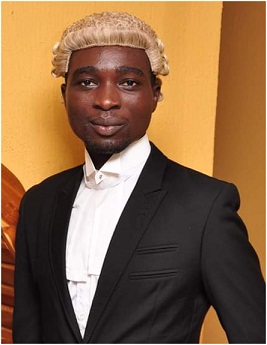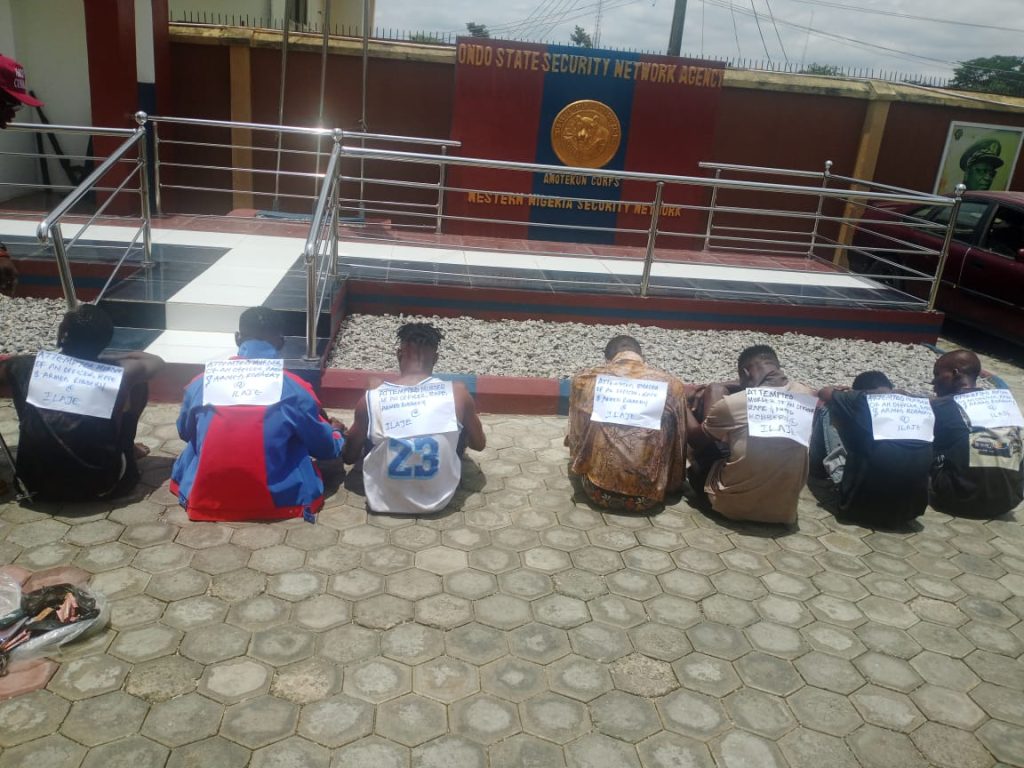Can underage sue or be sued?
By Bamidele Kolawole
|
The capacity to sue or be sued resides with what the law refers to as juristic person. A person has the capacity to sue or be sued if he or she is a juristic person either as a natural person or as artificial person.

An action must be brought by a competent legal person(s) (natural or artificial) in a court of competent jurisdiction else it would be void. The law currently is that a child is a person under 18 years and such person lack capacity to sue or be sued. See Section 29 (4) 1999 Constitution (as amended).
Under our relevant rules of court, infants are entitled to sue by their next friend/guardian and defend by their guardian. In Abuja, the rule provide that an infant is only entitled to enter appearance by his guardian.
Before a person can sue as guardian of a person under legal disability, the person shall file a written authority for that purpose at the court’s Registry.
An application is made to court for an order that the name of the person be used as next friend. The application is by motion ex-parte, supported by an affidavit to which is attached an exhibit, which is the written authorization of the proposed next friend, together with a written address.
In Lagos, a person under legal disability which includes an infant may sue or defend by their guardians appointed for that purpose. See Order 15 Rule 9 and 10 High Court of Lagos State (Civil Procedure) Rules 2019.
The person must be fit and proper to be appointed and does not have an interest inimical to that of the infant. Under the Abuja rules also, a person who intends to defend an action as guardian on behalf of an infant should make an application to court.
The letter of consent to act as guardian signed by the proposed guardian is to be attached to the affidavit. Also a written address should accompany the application. A next friend or a guardian may be a parent or other relation or friend to the infant, but not a mere volunteer.
To conclude, an infant can sue. However, because he or she has not attained the age of maturity in Nigeria, he or she can only sue through a guardian.

The issue of an underage person’s ability to sue and be sued has to do with what we call “parties/party” to suits. It is very important that a suit discloses or presents appropriate PARTIES to the suit before the court, otherwise, such suit could be declared as incompetent on that Technical ground, in this instant consideration, due to lack of capacity by age.
For an underage person to be capable of been sued or be able to sue, one of the following conditions must be in place,1.the underage person must be among other person(s) who are Adults, suing or been sued. 2.the underage person is in the suit as couple with an Adult partner in Marriage. 3.the underage person alone, can sue through next friend and be sued through an Adult guardian ad litem as representative.
The underage definition vary from one Jurisdiction to another and must often than not, is not limited to infants alone.
In Nigeria underage is between 1day-17years 364days old, the leap year issue could come to play at times, that is, underage is 18years less 1day.
Suing an underage person alone is fatal to the success of a case, and when an underage person sue alone, the adult Defendant must bring Application to stay action on till a guardian ad litem is appointed to appear in the suit along the way underage as Defendant, so as to make the suit competent.

As a matter of fact and practice, minors can be sued if it is determined that they are old enough to form intent to commit a particular tort or are sensible enough to prevent from a negligent act done by them or be it a criminal act.
A Minor is an individual under the age of full legal capacity. Section 29 (4) (a) of the 1999 Constitution, defines full age as the age of 18 years and above. [1] In other words, anyone from seventeen and below, will be regarded as a minor.
Child’s Right Act (2003) is the law that guarantees the rights of all children in Nigeria. So far 24 out of 36 states of Nigeria have adopted the CRA as a state law.
You cannot maintain an action against a minor in Nigeria except the minor is being sued for necessities. Rather, an action can be maintained against a minor for other reasons through their legal guardian. To determine whether a person has a right of a cause of action in court, then he/she must be directly affected by the fact or series of facts of the action.
Since a Minor is not capable of entering into a contract, even suit, which is instituted by him, will be filed in his name by his “next Friend”, i.e. any other person who has attained majority in some way.
Such “Next Friend” should be closely related to the minor so as to bonafidly ascertain the interests of the minor, for instance father, mother, brother, sister etc, or guardian. He does not become a party to the suit but merely represents minor’s interest.
Any person can be appointed, as the “Next Friend” or guardian of the minor as long as he is of sound mind, has attained majority, has no interests adverse to that of the minor’s and he is not defendant or plaintiff in the suit.
Where there is neither any guardian appointed by a competent Authority, nor any other person fit and willing to act as a guardian for the suit, the Court can appoint any of its officers as a guardian to the suit.
The procedure for instituting or defending a suit brought by a minor is largely guided by the rules of court. A next friend can be removed by the Court if his interest becomes adverse to that of the minor and for other similar reasons. The Court may permit a guardian for the suit to retire or may remove him if he does not do his duty or for any other sufficient reason.
Minors as Criminal Offenders:
Rape, violence, and all other forms of sexual offences are criminal offences. So, this section focuses on rape and all other criminal offences where the offenders (suspected offenders) are minors (persons less than 18 years old).
Prior to the amalgamation of the Southern Protectorate and the Northern Protectorate in 1914 to birth Nigeria, the nations on the two sides had their unique systems and traditions. To date, this is clear in the two different criminal laws that operate in the Sothern part of Nigeria and the Northern part of Nigeria.
The Criminal Code is the criminal law operational in the Southern part of Nigeria, while the Penal Code operates in the Northern part of Nigeria.
The two (2) criminal laws have their points of similarities and differences. Popular among them is the fact that adultery is an offence in the Northern part of Nigeria but not an offence in the Southern part of Nigeria.
In the north of Nigeria, the federal offences are contained in the Penal Code (Northern States) Federal Provisions Act (No. 25 of 1960). Federal offences include treason, sedition, and customs offences. The non-Federal offences are contained in the various Penal Code Laws operating in States in the north of Nigeria.
In both Southern Nigeria and Northern Nigeria, there are special provisions for minors. The laws believe that there are specific ages for human beings to acquire the ability to understand good and bad and differentiate evil from good. Yes, the laws could not close their eyes to human psychology. This is also the point where many Nigerians erroneously conclude that minors cannot be held responsible for crimes. This common belief may be wrong, as the succeeding paragraphs will reveal.
The Culpability of Minors in Nigeria:
Across many states in Nigeria, minors are persons below 18 years. Contrary to popular belief, not all minors are free from paying for their (crimes) sins. There are special minors of certain ages and capacities that are free like air and will always get away with any crime. Also, their location (States) in Nigeria may matter. Hence, we will expose the minors that cannot be held responsible for their crimes according to the relevant.
The Criminal Law of Lagos State, unlike many other criminal laws in Nigeria, does not provide that the child should have or not have the capacity to understand the crime. It simply says that a person below 10 years old has no criminal responsibility in Lagos State.
Section 30 of the Criminal Law of Lagos State, provides;
“A person under the age of ten (10) years is not criminally responsible for any act or omission.”
The focus on the ages below ten (10) years in Lagos State means that although minors are from ages zero (0) to less than eighteen (18), any minor that is ten (10) years or above will be fully responsible for his/her criminal actions. See Onyekachi Umah, Esq., LL.M, ACIArb (UK) “When Minors are Criminals in Nigeria .“

An underaged can sue and she can be sued in law subject to fulfillment of certain condition precedents that will vested the capacity to sue and be sued on him.
Under the Nigerian Law, an action will be declared incompetent unless the parties to the suit are shown to possess the requisite capacity. For an action to be competent, it is required that the parties must be legal persons either natural (humans) or juristic (companies). Thus, non existing persons cannot be sued.
The law presumed that a child cannot personally institute a law suit and lacks the capacity to employ or enter into an enforceable contract for legal representation. Hence, ordinarily a child cannot sue personally but through a proxy.
As a matter of law and fact, a child is a person with inalienable rights. One of the rights of a child is the right to sue and be sued. According to Collins (online) Law Dictionary, an underage is a person who is (ordinarily) legally too young to do certain things, for example to drink alcohol, have sex, or vote. In most of the States in the United States of America (USA) and under the Children and Young Persons Act, and underage is a person who has not reached 21 years old.
In the old case of Labinjo v Abake (1925) 5 NLR, 33, a person is deemed an underage in Nigeria. Generally, an underage cannot enter into an enforceable contractual agreement. However, for the purpose of this discussion, the world ‘child’ is taken to mean ‘an underage’.
A child, no matter how young, even an unborn child has some salient rights that may be judicially protected. For instance an unborn child has a right to inherit some categories of properties forming part of the intestate estate of either of his or her parent after birth.
A child has the right to be given a name (either at the point of birth or any subsequent date as dictated by the culture of his parents or guardian) and to be minimally provided for.
The Child Rights Law of Ondo state also makes provisions to protect the entitlement of a child to rest and leisure and to engage in play, sports and recreational activities appropriate to his age and health status.
To participate fully in cultural and artistic activities. Every child under Ondo State Child Rights Law is entitled to the best attainable state of physical, mental and spiritual health and immunization for children under the age of 2.
But importantly, every child is entitled to basic education, i.e., primary and junior secondary school. Under the Labour Act, a child cannot be employed to work in any capacity except where he is employed by a family member on light work for agricultural, horticultural, or domestic work as maybe approved by the Minister of Labour. Or be required in any case to carry, move or lift any objects so heavy as to be likely to injure his physical development.
All these rights of a child can be violated and the law provides avenue for the child to enforce the rights judicially.
On the other hand, an underage is also assigned some civil and criminal responsibilities. However, a child under 7 years cannot commit any criminal wrong in the eye of the law.
Between the age of 7 to 11 (12) years, a child cannot be criminally tried for an act or commission unless it is shown that the child has the capacity to know he ought not to have acted the way, he acted. A male child below the age of 12 is presumed to be incapable of having carnal knowledge. Carnal knowledge here means, engaging in sexual activities.
However, the law is seemingly moving and this presumption of law therefore, it can be argued, to be subjected to a rubbutable proof. Thus, this presumption can be dispelled by tendering relevant evidence to prove that the underage (under 12) actually have the capacity to have carnal knowledge, at least, to show that the child is responsible for the outcome of the sexual act.
Therefore, in order to enforce his or her right, under the Constitution (Chapter 4) or any other law, or legal instrument, contract or agreement, a child can sue and be sued as provided for by the law: he or she can sue through his legal guardian which in most cases is the parents, or a person in loco parentis, that is, a person legally responsible for and expected to take on some of the functions and responsibilities of a parent.
Therefore, the condition under which an underage can sue and be sue is when he sue or is sued in proxy: his parents, legal guardian or through a person in loco parentis.

According to our constitution an underage means a minor and it connotes somebody who has not attained 18 years of age. The law defines it as an individual under the age of full legal capacity. Section 29 (4) (a) of the 1999 Constitution, defines full age as the age of eighteen years and above, alternatively, it means anyone below 18 is a minor. Therefore, 18 years is called the age of maturity, however, this may differ from jurisdiction (country) to country. In Section 277 of the Child’s Right Act, a person below 18 is called a minor, formerly it used to be 21 years.
The next question is whether a minor has legal capacity or not. It must be said categorically that not everybody can sue and be sued in Nigeria. It is expected that the person to sue or be sued has the prerequisite requirement of law.
Minors are categorized under people with legal disabilities, this includes people with unsound mind, lunatics.
The heading will be like this ….. DELE OJO … PLAINTIFF/CLAIMANT(suing through his next friend, MR. BIMBO OJO, this is further established and confirmed by the apex court in Nigeria; Supreme Court.
It is also imperative to state it in the claim as part of the pleadings that the Person is a minor.
In Nigeria, a minor cannot sue or be sued, You cannot maintain an action against a minor in Nigeria except the minor is being sued for necessities. Rather, an action can be maintained against a minor for other reasons through their legal guardian ad litem.
To determine whether a person has a right of a cause of action in court, then he/she must be directly affected by the fact or series of facts of the action.
When a minor institutes an action directly or he/she is being sued in the capacity of a minor and no guardian is sued alongside, since the minor lacks legal capacity, the matter will not be heard in our courts rather, it will be struck out for lack of legal capacity. The procedure highlighted above must be strictly followed.

The capacity to sue or be sued resides with what the law refers to as *juristic person*. A person has the capacity to sue or be sued if he or she is a juristic person either as a natural person or as artificial person.
A natural person is a person just like you and I with all the attributes of Homo Sapiens while artificial persons are body corporates or Bodies covered with the garb of juristic person.
An underaged person is referred to in law as a *minor*. As a human being, the law accords a minor rights which any adult could enjoy. Nevertheless, minors, because of their age and for the purpose of protecting them are precluded from engaging in some legal transactions or endeavours.
This legal position is not absolute as there are some exceptions to it. For example, a minor does not possess the legal capacity to hold title to land in whatever form.
But a minor can hold title to land through a proxy such as Trustees, Next Friend and/or Guardian ad litem until he or she attains the age of majority where he or she can lawfully holds title to land.
Now coming to whether a minor can sue or be sued; though a minor or an underaged person as you put it has no legal capacity to sue or be sued, he or she can still access justice by suing or being sued through his or her next friend, guardian ad litem or any other person appointed by operation of law.
In other words, a minor for example can sue through his or her adult father, mother, brother, sister or Guardian ad litem. In the case of NPF & ORS v. OMOTOSHO & ORS (2018) LPELR-45778(CA), the Court of Appeal while citing the Federal High Court (Civil Procedure) Rules, 2009 held that: “The law seems settled beyond peradventure that only juristic persons in whom rights and obligations can be vested are capable of being proper parties to law suits before Courts of law.
It is hornbook law that a Court cannot engage in adjudication when the proper parties are not before it. There must be proper parties either as plaintiff or defendant before any Court can exercise its jurisdiction.
Proper parties is therefore an issue of jurisdiction…Order 9 Rules 10 and 11 of the Federal High Court (Civil Procedure) Rules, 2009 provide as follows: ’10.
Persons under legal disability may sue by their guardians or defend by guardians appointed for that purpose as already stated the 2nd-4th Respondents are minors who are under a legal disability and cannot maintain an action _eo nomine_ but can only sue through their next friend or guardian ad litem.”
In conclusion, an underaged or minor, though under legal disability, can sue or be sued through his or her next friend, guardian and litem or any other person authorized by law.

In civil matters, an underage can sue and be sued where he enter into contract for goods known in law as necessaries. This was the position of the court in the case of Nash v Inman.
In criminal law, an underage can be charged under the following circumstances;
(1) Where he’s Charged with an adult.
(2) where he’s charged for murder or capital offences.









